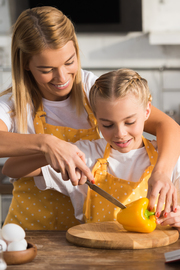Practical Food Safety Tips Parents Should Teach Their Kids
Teaching children about food safety is crucial for their well-being and helps them develop healthy living habits. Parents can ensure their kids understand the importance of handling food safely by instilling these practices early. This blog post will cover practical food safety tips parents should teach their kids to keep them safe and healthy.
Handwashing Before Handling Food
Proper handwashing is one of the most fundamental food safety tips. Instilling the ritual of washing one’s hands with soap and water for twenty seconds is essential. This habit helps kickstart the reasonable routine of washing away harmful bacteria before handling food.
Using Separate Cutting Boards
Cross-contamination is a significant concern in food preparation. The best way to mitigate risk is to instruct your kids to use separate cutting boards for raw meats and vegetables. This practice ensures that harmful bacteria from raw meat do not contaminate other foods. Using separate cutting boards creates a safer cooking environment.
Safe Cooking Temperatures
Educate your children on cooking foods to the proper internal temperatures to kill harmful bacteria. Teach your little ones to use a food thermometer when cooking proteins, such as steak cuts or chicken thighs. Explain why this step is essential for food safety when doing this.
Not Sharing Utensils
Encourage your kids not to share utensils or drinking cups with others. While sharing is caring, this adage doesn’t apply to the tools we use for eating and drinking. Describe how germs transfer from one person to another through shared items and how those germs can make them sick. Emphasize the importance of personal hygiene and using personal utensils and cups to promote a healthier living environment for everyone.
Basic Knife Skills
One of the most essential cooking skills kids should know by age 10 is basic knife skills, such as using a butter knife for spreading condiments on toast and a sharper knife for cutting meat. Teach them how to handle knives safely and which are appropriate for different tasks.
Using Alternatives to Sugar
Encouraging the use of healthier alternatives in cooking can be a valuable habit to pass on to your kids. Introducing them to nutritious ingredients early on sets a foundation for lifelong healthy eating habits. For instance, while discussing the benefits of reducing sugar intake, you might mention that honey makes a great sugar substitute. Teaching children the importance of balanced meals and mindful ingredient choices can impact their overall well-being.
Storing Leftovers Safely
Proper storage of leftovers is essential to prevent foodborne illnesses. Teach your kids the importance of refrigerating leftovers right after everyone has finished eating. Ensure they understand why they should use airtight containers and record the date to track how long you can safely store the food.
Cooking Safely in the Kitchen
Incorporating these practical food safety tips parents should teach their kids into your daily routine ensures your children understand the importance of food safety. Teaching them how to cook and handle food safely is a valuable skill that will benefit




